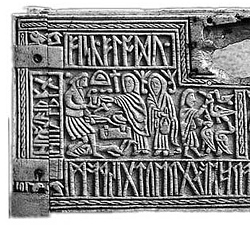
 |
||||||||||||||||||||||||||||||||||||||||
|
||||||||||||||||||||||||||||||||||||||||
Back to the Anglo Saxon Survival Guide Index |
||||||||||||||||||||||||||||||||||||||||
Language
Old EnglishThe Anglo Saxon's used a language called Old English and evolved out of Old German - the language spoken in the homelands in West Germany. Old English was in use between the 5th and 11th centuries when it merged with Norman French and produced middle English - the language of Chaucer.
Old English looks and sounds VERY alien to a modern English speaker. Here is a reading of the Lord's Prayer in Old English:
Here is the text in Old English and Modern English:
Fæder ure þu þe eart on heofonum; Si þin nama gehalgod to becume þin rice gewurþe ðin willa on eorðan swa swa on heofonum. urne gedæghwamlican hlaf syle us todæg and forgyf us ure gyltas swa swa we forgyfað urum gyltendum and ne gelæd þu us on costnunge ac alys us of yfele soþlice Translation of the Old English Text: Father our thou that art in heavens be thy name hallowed come thy kingdom be-done thy will on earth as in heavens our daily bread give us today and forgive us our sins as we forgive those-who-have-sinned-against-us and not lead thou us into temptation but deliver us from evil. truly
Whilst much of modern English comes from the French brought by the Normans, the majority originated in an older form of English. This then is how our ancestors would have sounded.
Much of Old English survives in names for our days and our towns.
Anglo Saxon Day Names The Germanic races took the Roman day names that they encountered with dealings with the Roman Empire and translated it into Old German, Old Norse and ultimately Old English. They replaced the Roman gods with there own (with the exception of Saturday).
|
||||||||||||||||||||||||||||||||||||||||
Anglo Saxon Town and Place Names |
||||||||||||||||||||||||||||||||||||||||
Many elements in our modern English place names ultimately come from Anglo Saxon place names. Often a name would combine a reference to the owner of the land and some description about it.
Here are some common elements in place names:
barrow a wood burna (-borne) a brook, stream burh (modern word - borough) Fortified town combe Small valley ford a shallow river crossing dun - a hill eg (-ey) an island halh - a nook, corner of land ham - a homestead hamm - an enclosure, water-meadow hurst wooded hill ingas (-ing) the people of ... leah (-ley) a clearing stede - a place, site of a building tun - an enclosure, farmstead well - a well, spring wick Farm or dwelling worth - an enclosure, homestead
Here are some examples of Old English place names and the modern name and what it means:. |
||||||||||||||||||||||||||||||||||||||||
Anglo Saxon Months
The Anglo-Saxon year was originally divided into twelve lunar months (which mean 'moons'), but this created a problem because a lunar cycle is about 29.5 days. The results was a 354 day year. After only a few years the lunar and solar months would be out of alignment. To get around this issue the Anglo-Saxons would have leap years and would insert an extra month into the summer. THe summer was one long 2 month period called liða, roughly corresponding to June and July.So the leap years was called Ðriliði (three liðas).
The year began on Modranecht, Mothers' Night, the 25th of December. This festival was later adopted as the date for Christmas in the typical pragmatic style of the Church. Its possible that Anglo- Saxons honoured female ancestral spirits on this day.
December and January were both called Giuli, or'Yules'. Yule, was the name for the winter solstice period - the shortest days in the year when the anglo Saxons would drive away the drakness by feasting. December was roughly equivalent to Ærra Geola, or 'before Yule', and January was Æfterra Geola, 'after Yule'.
February was known as Solmonað or 'Mudmonth'.
March was Hreðmonað possibly named after a goddess Hreða of which we know little.
April corresponded with the lunar month of Eostermonað named again after an obscure deity called. This month has survived into modern times as the word Easter which is typically celebrated in March or April.
May was Ðrimilcemonað, 'month of three milkings'. "So called because in this month the cattle were milked three times a day," commented the 7th century historian Bede.
As has been said June was known as Ærra Liða, 'first' or 'preceding' Liða and July was Æfterra Liða, 'following Liða'. The word Liða might mean sailing as this was the time of year when sailing was easiest due to calm weather. So this was the summer sailing season.
August was called Weodmonað, 'weed month' probably because weeds and crops wwere growing fast.
September was Haligmonað, 'holy month'. It was a time to give thanks to the gods for the fruits of the summer harvest. Harvest festivals stll survive in many countries into the modern period.
October was Winterfilleð - the begining of winter.
November was called Blotmonað. This many have been a month of sacrifices BUT more likely it was the time of year when the animals would be saluaghtered and preserved for the coming winter feasts.
Material on this page is sourced from Omniglot Wikipedia and English Place names
|
||||||||||||||||||||||||||||||||||||||||






